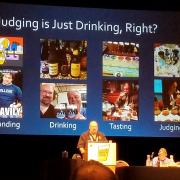I know there is a lot of information out there by way of books and youtube videos on how to make a yeast starter but I have a somewhat directed question that most of those resources don't answer. I am planning on brewing tomorrow but won't have my yeast until tonight and plan on making the starter as soon as I get home, this will essentially give the starter 16-18 to do its thing before I pitch it into my wort tomorrow evening. Couple questions:
1: is this long enough for it to hit high krausen and be ready for pitching?
2: I am brewing an extract porter with dark LME/DME/and steeping grains and Palmer says to make a starter with a similar composition to what you will pitching into but I was planning on using light DME to make the starter. Is it that important to use a similar makeup for your starter compared to that of your wort?
3: Palmer also talked about draining off the beer from your starter so all you pitch is the cake/slurry at the bottom. In a 1qt starter, will the flavor of the starter really make that much of a difference?
Thanks guys.










@Bill - I just posted the recipe...
+1
enash7070 said:
Bill is right...I use 10grams of light DME per 100ml of water and that will get you to 1.040. I add 200ml more water then the final volume I want and boil it for 10 min. So if I want 600ml starter I start with 800ml of water and boil...
My method is this....I use beersmith 2.0 to determine the starter size. It is possible to under/overpitch...and based on the datecode Beersmith, and also Mr. Malty (free yeast pitch calculator on web), determines the viability of the yeast (wyeast/whitelabs). If you use a stir plate you can get away with a smaller starter...
ALEs - Typically what comes prepackaged is enough and no starter is really needed. However...Since I have invested in a stirplate I do make starters for ales...especially if it is a big beer like my Chimay Blue Clone. My ale starters usually show activity within 12 hours...typical ale starters for me are 400ml to 800ml...
LAGERs - You need a starter...unless you have alot of money to buy extra yeast packs. This is why I invested in a stirplate.....My first Lager was a Bock and I pitched one vial...and then a couple days later...another...so that's $15 in yeast for a 5 gallon batch...and I swear it took a week to start fermenting...I like doing lagers and have done a couple Mexican lagers and currently doing a Turkish Pilsner. typical lager starters for me are 1400ml to 1800ml. When you are using that much starter you need to take that volume into consideration when filling your fermentor. Lager starters take a long time to kick off...24 to 36 hours is not uncommon on my striplate...btw..I use a 2000ml flask
I always pitch the whole volume of starter....
On a side note...I invested in a lager chest...I bought an old 5cu ft. freezer on craigslist for $20 and bought a love controller for $80 and installed it...one of the best investments I made in brewing...The love controller is digital and I can dial in the exact fermentation temp. I originally bought it for lagers...to get that 48F and then when it was idle I used it for an Ale and dialed in to 68F and forget it... This freezer easily holds my 6gal fermenting bucket.
I guess I could be accused of being anal...but yeast and fermentation control are the most important factor in brewing...
1. Probably not....but dont worry have a home brew.........
2. I would use what ever you have on hand and use the mr malty yeast pitching rate calculator.....
3. I like to crash cool it and decant ...but you need like a week in advance.... its no big deal since its a dark beer dont worry and have a homebrew
I am interested to read the answers to these questions, too.
1. If you're using dry yeast you wouldn't even need much of a starter at all. But, I think you told me you're using a WYeast smack pack. No WYeast smackpack has an ideal amount of yeast for any batch of beer. I think they're designed to be used to make starters. I'd go for it and give it as long as you can. 16-18 should give you enough time to get the yeast started reproducing and building reserves. Not to a maximal amount, but better than straight-pitching.
2. I wouldn't worry too much about the sugar make-up. It's advice for ideal starters but I don't think you'll need to worry about it. It won't have that much effect.
3. You'll never know the difference in a beer made with dark extract without an added 1 quart of beer made with light extract and one made without it. I would pitch the entire thing right in. A lot of people pour it off if they've been building a starter over a long course of time, in which case you might have strange flavors from autolysis or the beer being light-struck. It would be much more to your advantage to get the entire yeast count into the beer, including those suspended in solution.